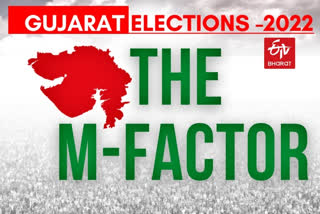Hyderabad: As BJP managed a record win on Thursday handing them the seventh consecutive term in Gujarat, the saffron party had not fielded a single Muslim candidate in a state which has 9 percent Muslim population. The move, it is believed, helped them exploit the M-factor to BJP's favour, sending a clear message to its loyal Hindu vote bank.
Only one Muslim candidate made it to the Gujarat assembly this time, Imran Khedawala, the sitting Congress MLA from Jamalpur-Khadia seat who defeated BJP candidate Bhushan Bhatt by 13658 votes. While Khedawala polled 58235 votes, Bhatt got 44,649 votes.
Interestingly, the saffron party had refrained from fielding Muslims even in seats where people from Abrahamic religions could have swayed the result, cementing its pro-Hindutva stand. The last time BJP fielded a Muslim candidate was in 1998.
Also read— Opinion: AIMIM, AAP, Congress making Gujarat elections easy grab for BJP
As for the principal opposition Congress, it had fielded six Muslim candidates. Arvind Kejriwal's Aam Aadmi Party (AAP) with three Muslim candidates, Asaduddin Owaisi's All India Majlis-E-Ittehadul Muslimeen (AIMIM) with 11 Muslim candidates and 177 independents took the poll plunge in the Gujarat Assembly elections held in two phases on December 1 and December 5.
Owaisi's AIMIM was dubbed by both the Congress and the AAP as BJP's "B-team" with the Hyderabad MP's party given monikers 'Green Lotus' and 'hidden Lotus'. Of the 182 Assembly segments, Muslims contested from only 72 Constituencies. Muslim voters accounted for 15-60 percent in 25 Assembly segments. As many as 36 Muslim candidates contested from Limbayat followed by Bapunagar with 29 Muslim candidates.
Muslim representation in Gujarat's Legislative Assembly has been on a declining trend since 1952. In 1980, the House had 6 Muslim legislators— the highest so far. The Assemblies formed in 1962 and 2007 had five each of Muslim Legislators. The strength of Muslim lawmakers dwindled to 2 in 2017.
